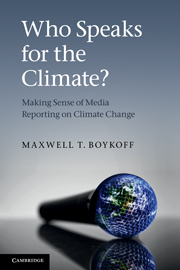4 - Placing climate complexity in context
Published online by Cambridge University Press: 05 June 2012
Summary
Climate change has never been a front-burner issue, and it’s the ultimate nightmare to communicate: you don’t see carbon in the air the way you see smokestack emissions. It’s global not local. The effects evolve over the long, long run.
Peter Applebome (2010)
Clearly, science and politics have influenced media coverage of climate change. Conversely, media representations have also shaped ongoing scientific and political considerations, decisions and activities. In other words, mass media have influenced who has a say and how. This chapter puts coverage of the complexities of climate science and governance into context, and interrogates how and why conditioning factors have contributed to media representations of climate change.
The practices of journalism take shape through relationships of power, where knowledge and meaning arise through discursive struggle (Hall, 1988). In professional journalism, power is partly expressed by the artefact of the media story itself (Foucault, 1975; 1984). Media actors generate stories within the opportunities and constraints of rich histories of professionalized journalism (Starr, 2004). Such mobilizations are complex and often subtle. Moreover, wider discourses shape power relations within journalism: socio-political and economic factors have given rise to distinct norms and values, and these influence ongoing journalistic practices (Bennett, 2002). In fact, as Chapter 5 will elaborate, discontinuities can arise in media coverage of climate change through the very professional journalistic norms and values that have developed to safeguard against potential abuses of asymmetrical power.
- Type
- Chapter
- Information
- Who Speaks for the Climate?Making Sense of Media Reporting on Climate Change, pp. 76 - 98Publisher: Cambridge University PressPrint publication year: 2011
- 1
- Cited by



